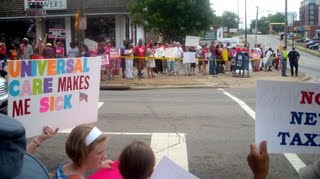Are We Ready for Self-government?

Recently there have been riots in Pakistan and Iran as usual and also in North Carolina and California and elsewhere. Mobs assembled, shouted, waved banners and made it clear that they were really, really angry about something. In Pakistan they burned down dozens of homes belonging to Christians, sometimes with the Christians inside. So far the American mobs have not gone that far.
The question has been asked repeatedly in editorial pages whether the Iraqis are ready for self-government. It may be more relevant to ask whether Americans are.
The mob is a venerable institution but we may forget how very “American” it is to form a mob. In pre-Civil War Philadelphia, Boston, New York, and many other cities mobs were a familiar part of life. Sometimes they were after African Americans, sometimes after the Irish, sometimes lesser game. In New York in 1849, mobs formed to shout down Shakespearean actors.
It seems that there were two rival actors, Mr. Macready and Mr. Forrest, whose rivalry had begun in England and been imported. Thus when Mr. Macready came on stage at the New York Opera House as Macbeth, the supporters of Mr Forrest were there to salute him with “a shower of missiles, rotten eggs, and other unsavory objects, with shouts and yells of the most abusive epithets.” The performance was, perforce, suspended, “the respectable part of the audience dispersed,” and calm was briefly restored. That was for starters.
The Macready contingent, however, made it known that they would not let their man be driven from the stage, so the next day Forrest’s forces posted notices in various parts of the city and “bands of ruffians, gratuitously supplied with tickets by richer rascals,” were sent to take possession of the theater. The police were on hand in force when Mr Macready began his performance and persisted in spite of yells and hisses. But the crowd outside assailed the exterior of the building, smashed windows, and demolished doors.
The diarist, Philip Hone, was making his escape, thankful to be unharmed, when he met a detachment of troops – some sixty cavalry and 300 infantry – on their way to the battle. Another detachment arrived by another route. Both were assailed by the mob and some were severely injured. At this point, orders were given to fire and three or four volleys were discharged killing at least twenty and wounding many more. Meanwhile, Macready changed clothes with another actor, was smuggled in a carriage to New Rochelle, caught a train to Boston, and left a few days later for England
This is one story of many. Twenty years earlier, abolitionists built a hall in Philadelphia only to have it burned down by a mob. In New York, in 1863, riots provoked by the seeming unfairness of the draft laws, resulted in the death of over a hundred, and the burning down of at least fifty buildings, including two churches. African Americans were a particular target and an orphanage for black children was burned down. Since the mob was primarily working class and Irish, Protestants were also in danger. Famously, as the mob approached the General Seminary a seminarian put on his cassock and stood on the steps to say “This is a catholic institution.” The mob roared on by.
There were riots in Detroit in World War II, in Los Angeles during Viet Nam, and in New York and elsewhere when Martin Luther King Jr. was assassinated. It is a venerable instrument of radical politics in this country. We remember, of course, the mobs that attempted to intimidate the ballot counters in Florida in 2000. So here we go again. Are we ready for self-government?
 Christopher L. Webber
Christopher L. Webber